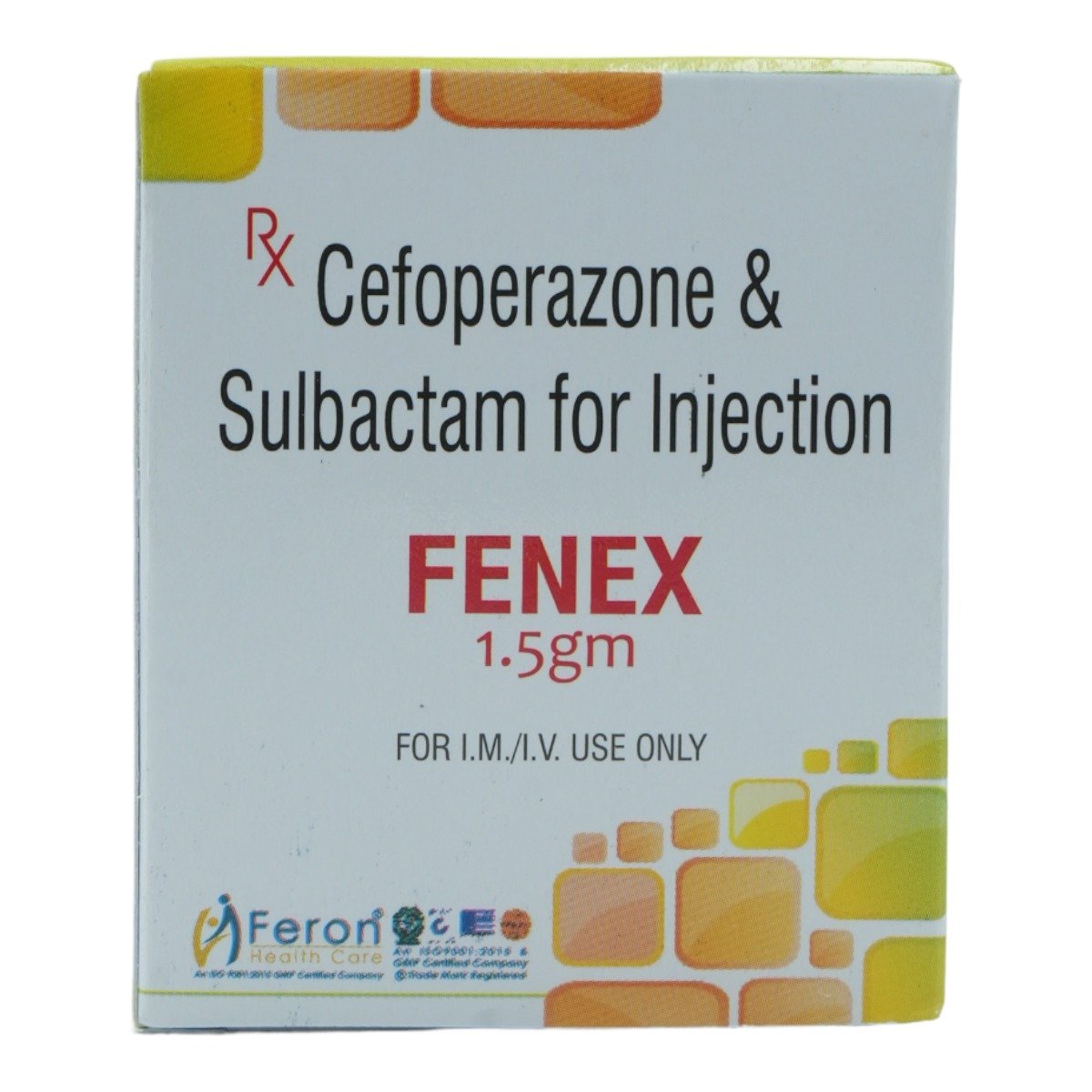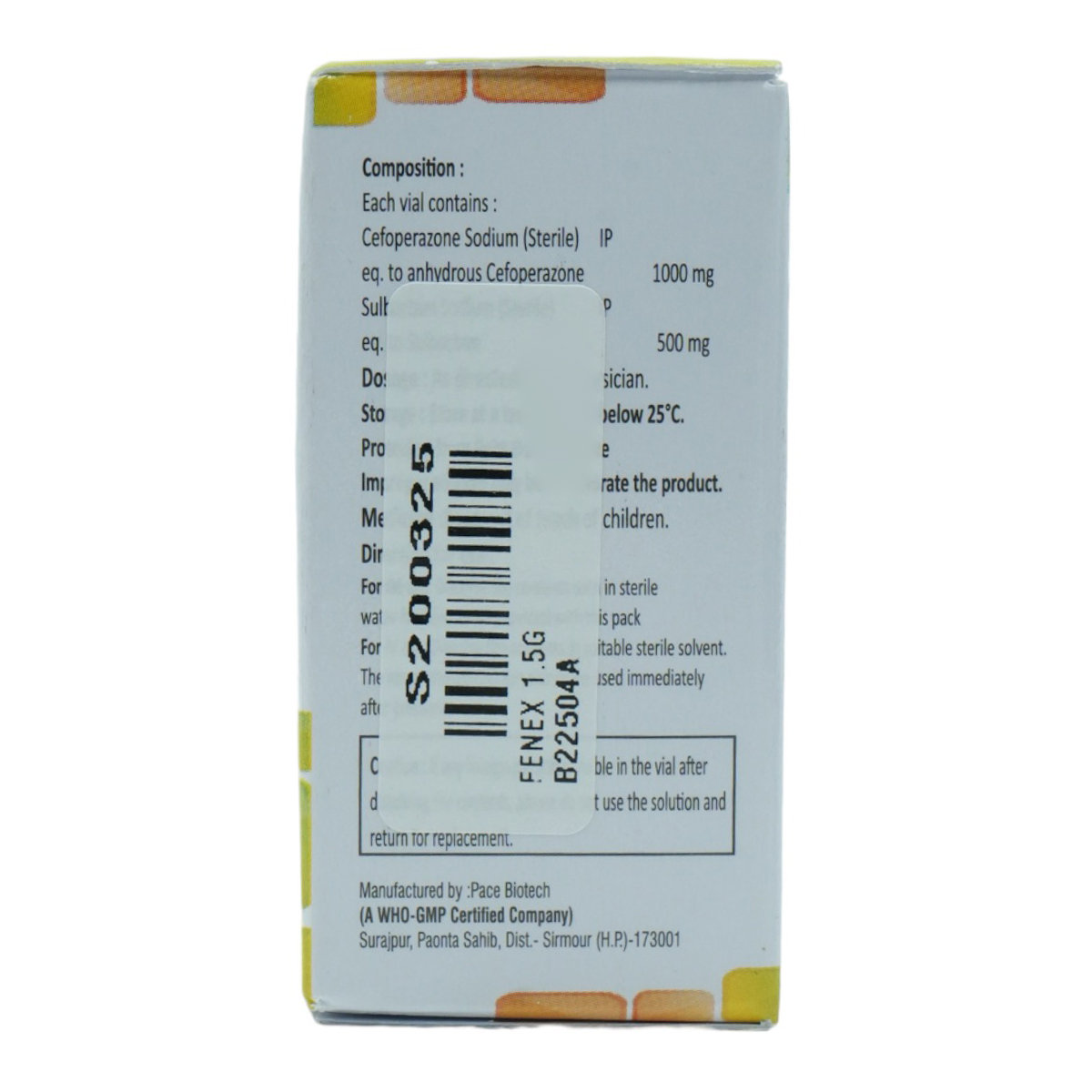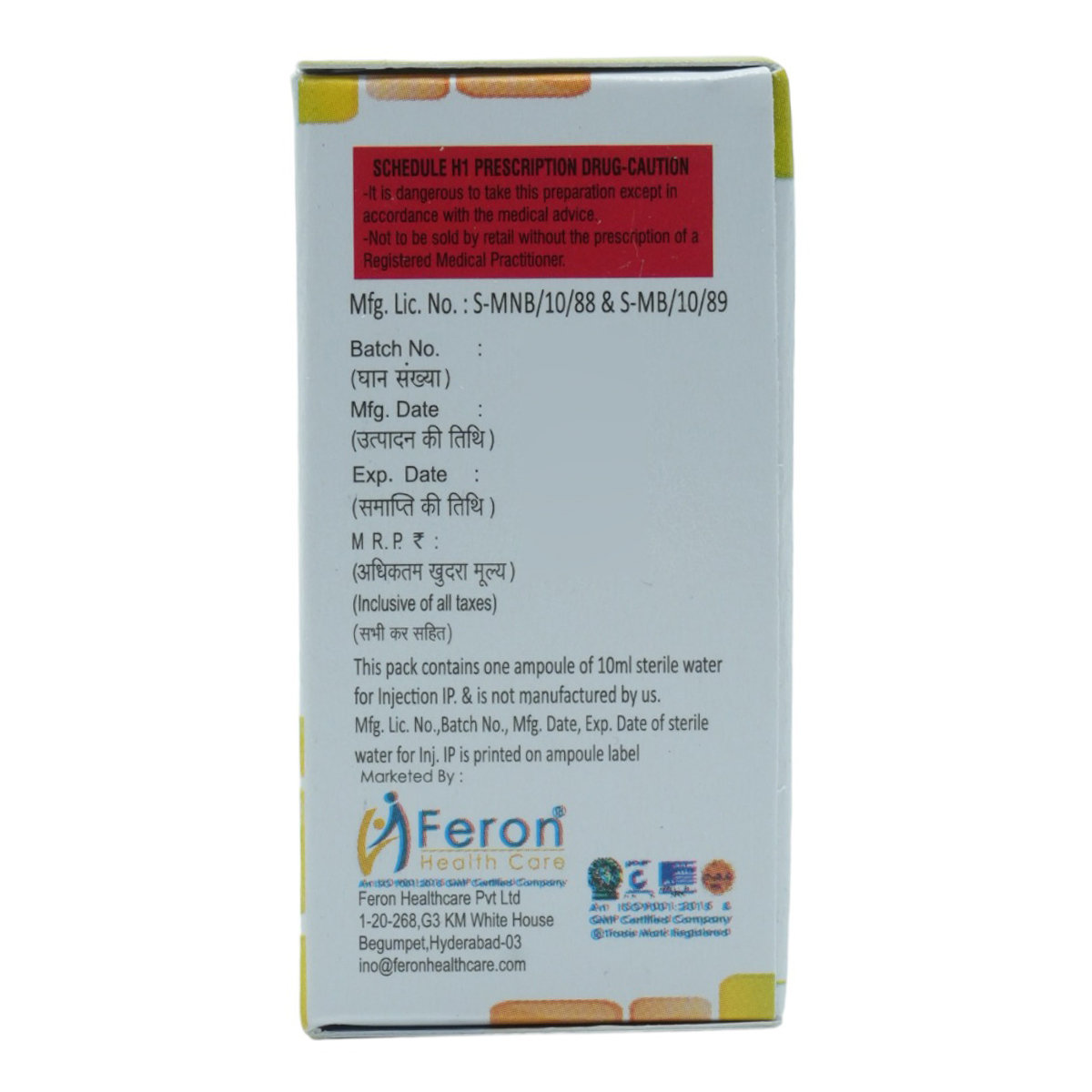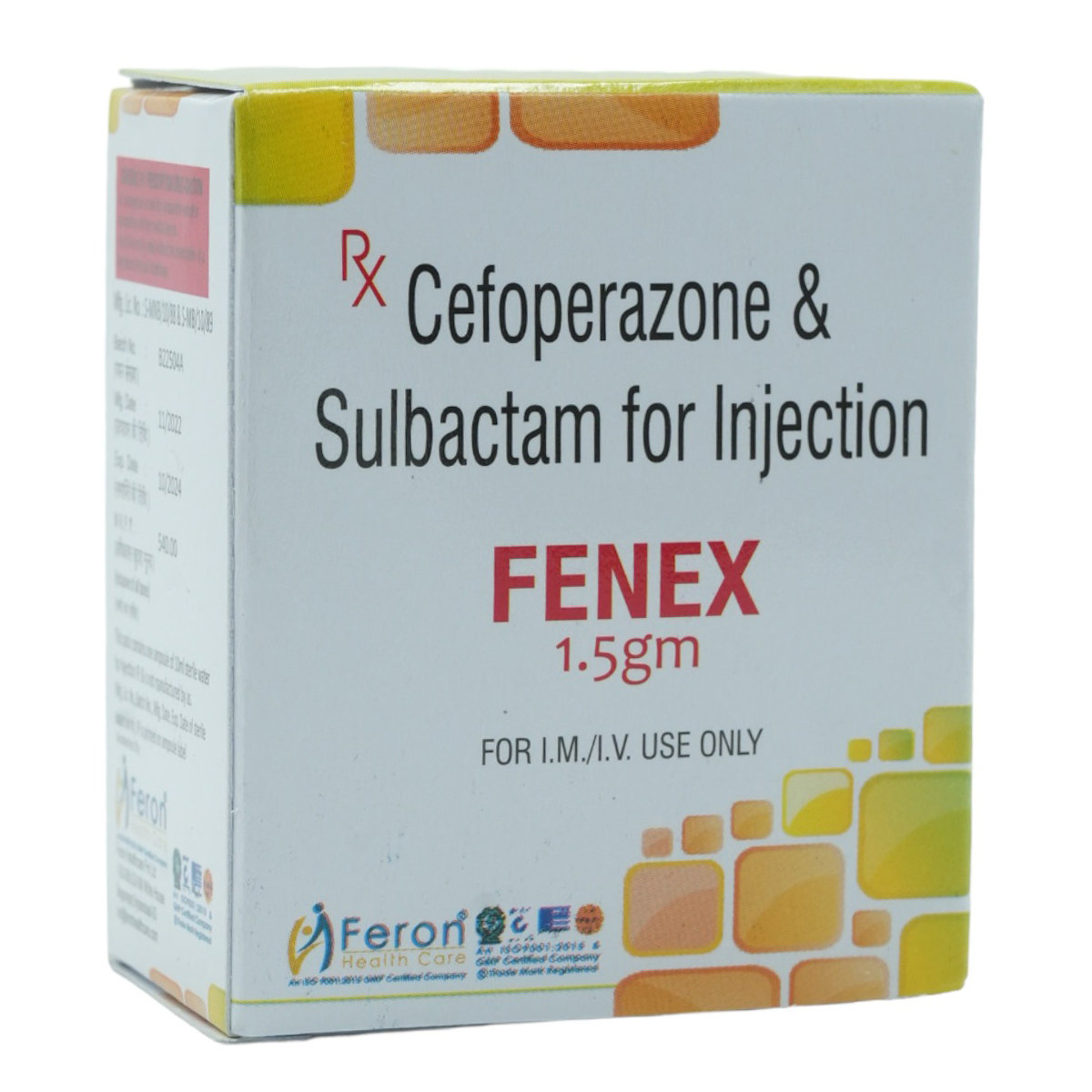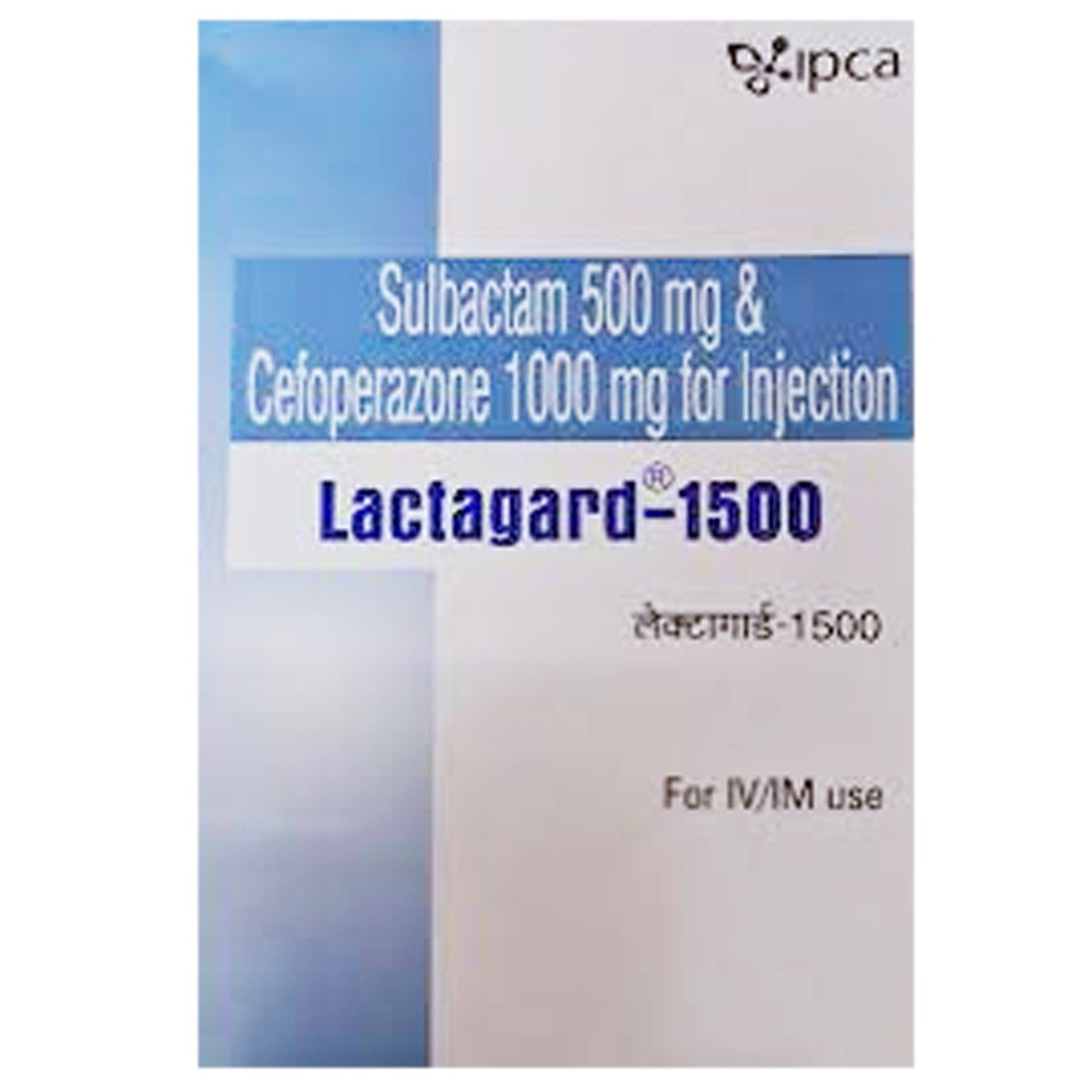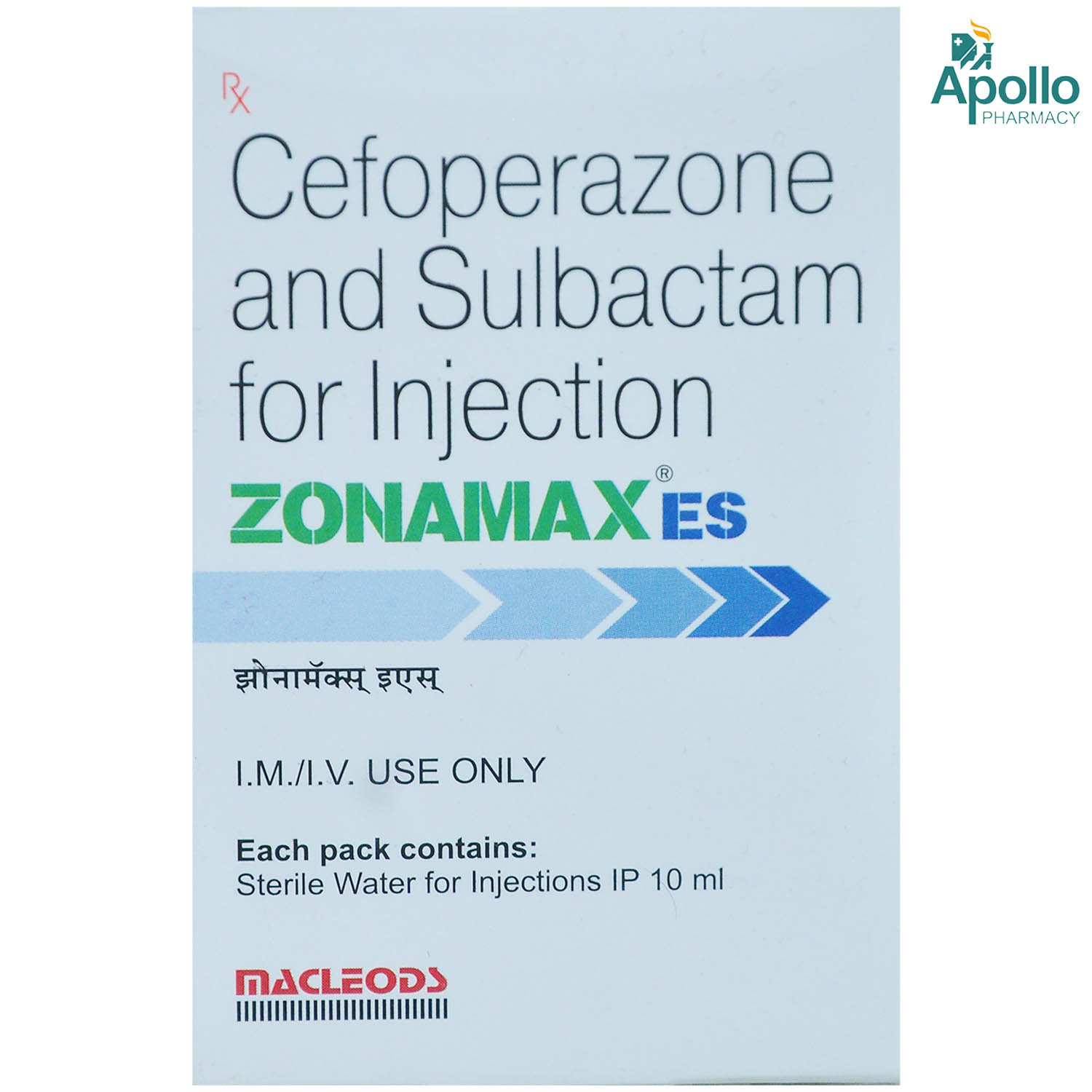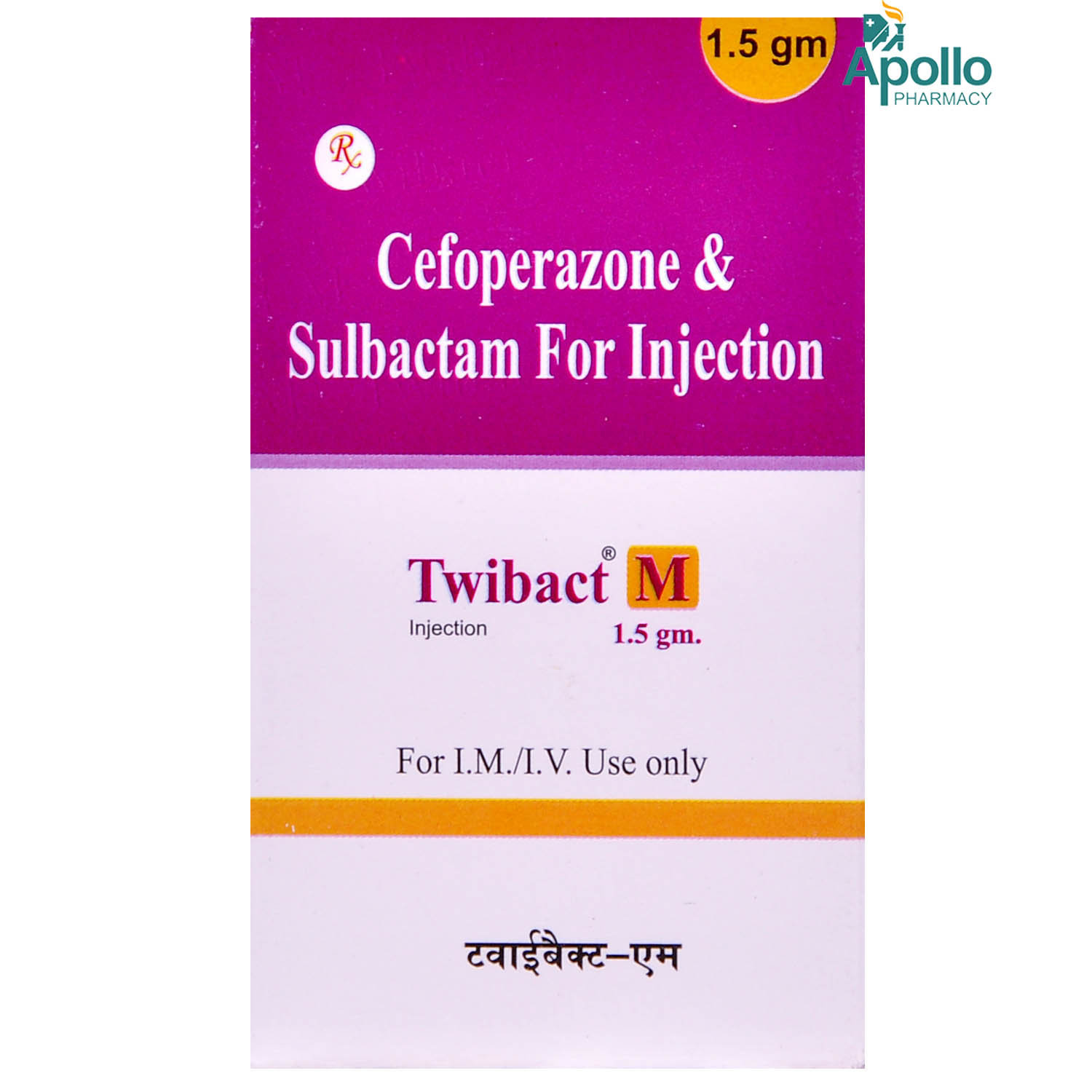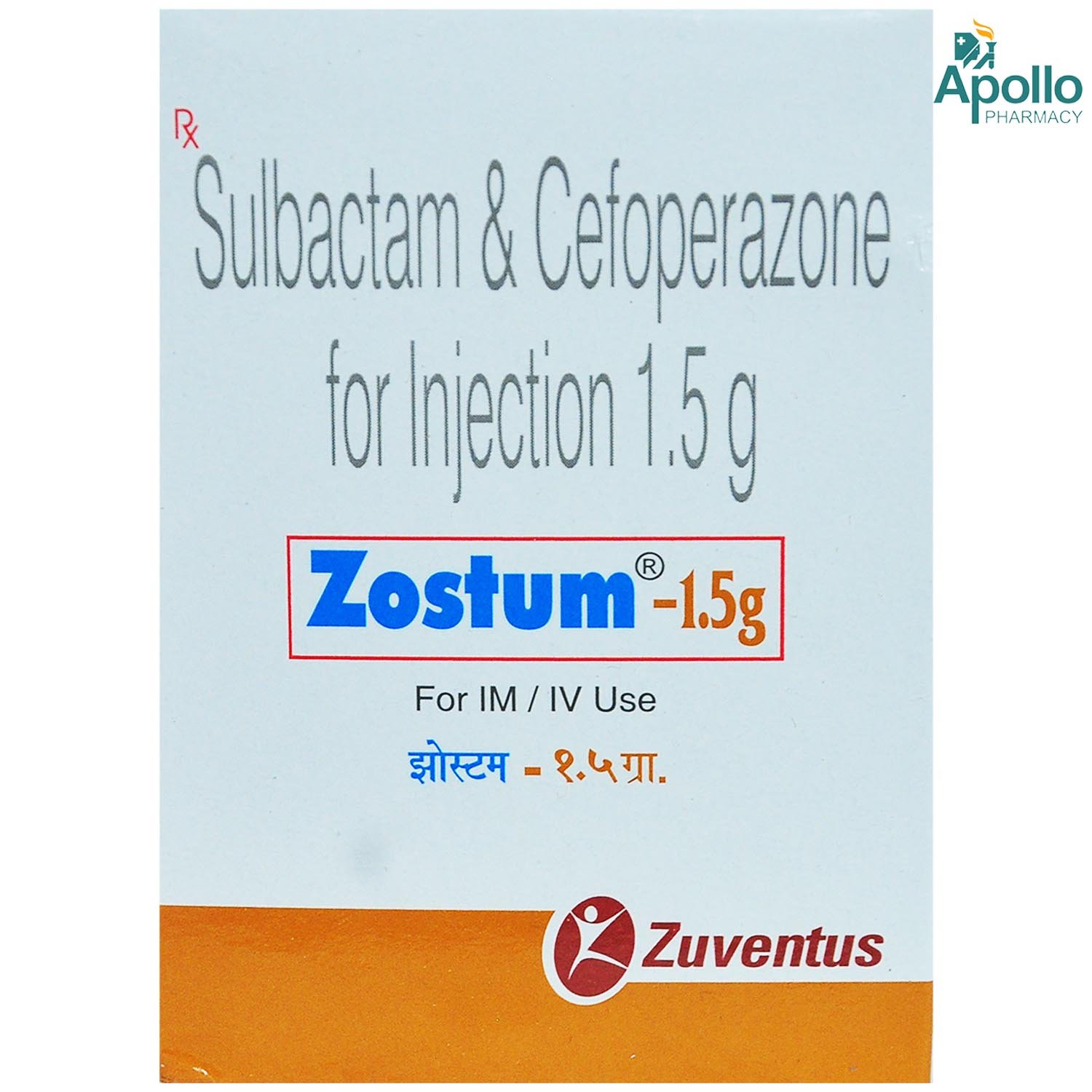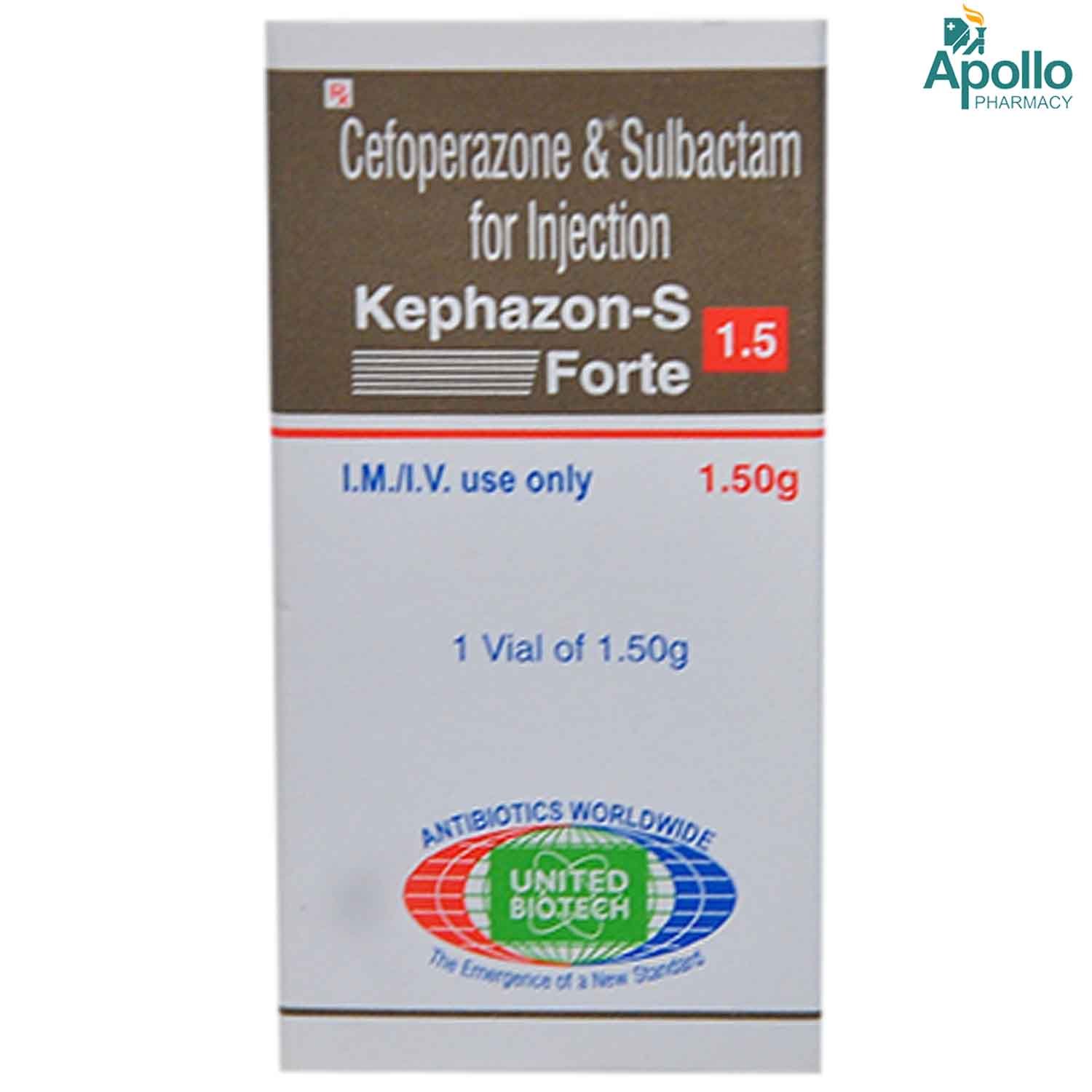Fenex 1.5 gm Injection 1's
MRP ₹506
(Inclusive of all Taxes)
₹75.9 Cashback (15%)
Provide Delivery Location
Online payment accepted
 Prescription drug
Prescription drugWhats That
Composition :
Manufacturer/Marketer :
Consume Type :
Expires on or after :
Return Policy :
About Fenex 1.5 gm Injection
Fenex 1.5 gm Injection belongs to the group of medicines called antibiotics used to treat various bacterial infections such as respiratory tract (lungs) infection, urine infection, blood infection, meningitis (inflammation of the brain and spinal cord), gonorrhoea (sexually transmitted disease), skin, abdominal, bone, and joint infections. Bacterial infections are caused due to the multiplication of harmful bacteria inside or on the body. Infectious or harmful bacteria can make you sick and reproduce quickly in your body. These harmful bacteria produce chemicals known as toxins, which can damage tissue and make you sick. Fenex 1.5 gm Injection does not work against infections caused by the virus, including cold and flu.
Fenex 1.5 gm Injection is a combination of two antibiotics, namely: Cefoperazone (cephalosporin antibiotic) and sulbactam (beta-lactamase inhibitor). Cefoperazone works by preventing the formation of bacterial cell covering, which is necessary for their survival. Thereby, kills the bacteria. On the other hand, sulbactam works by decreasing bacterial resistance and enhancing the activity of cefoperazone against the bacteria. Together, Fenex 1.5 gm Injection helps to treat bacterial infections.
You may experience diarrhoea, allergic reaction, abnormal liver function tests, and anaemia (low number of red blood cells). Most of these side effects of Fenex 1.5 gm Injection do not require medical attention and gradually resolve over time. However, if the side effects are persistent, reach out to your doctor.
Before starting Fenex 1.5 gm Injection, please inform your doctor if you have any allergy (against any antibiotic), kidney or liver problems. Do not take Fenex 1.5 gm Injection on your own as self-medication may lead to antibiotic-resistance in which antibiotics fail to act against specific bacterial infections. Consult your doctor before taking Fenex 1.5 gm Injection if you are pregnant or planning for pregnancy. Avoid taking Fenex 1.5 gm Injection if you are breastfeeding as Fenex 1.5 gm Injection may pass into breast milk. Avoid alcohol consumption while taking Fenex 1.5 gm Injection to prevent unpleasant side-effects.
Uses of Fenex 1.5 gm Injection
Directions for Use
Key Benefits
Fenex 1.5 gm Injection belongs to the group of medicines called antibiotics used to treat various bacterial infections such as respiratory tract (lungs) infection, urine infection, blood infection, meningitis (inflammation of the brain and spinal cord), gonorrhoea (sexually transmitted disease), skin, abdominal, bone, and joint infections. Fenex 1.5 gm Injection is a combination of two antibiotics, namely: Cefoperazone (cephalosporin antibiotic) and sulbactam (beta-lactamase inhibitor). Cefoperazone works by preventing the formation of bacterial cell covering, which is necessary for their survival. Thereby, kills the bacteria. On the other hand, sulbactam works by decreasing bacterial resistance and enhancing the activity of cefoperazone against the bacteria. Together, Fenex 1.5 gm Injection helps to treat bacterial infections.
Storage
Drug Warnings
After taking Fenex 1.5 gm Injection if you have allergy-like symptoms including rash, swelling of the face/lips/throat, difficulty in breathing, or tightness in the chest, immediately contact your doctor. Do not take Fenex 1.5 gm Injection if you have an allergy to Fenex 1.5 gm Injection, cephalosporins penicillin class of antibiotics as it may cause a skin rash, itching, and difficulty in breathing. People having liver disease or jaundice (yellowing of skin/eye) should not take Fenex 1.5 gm Injection, as it can damage your liver severely. You may have diarrhoea in some cases which can be managed by taking it with any probiotics and plenty of fluids. Do not take antacids along with Fenex 1.5 gm Injection; maintain a gap of 2-3 hours between both. Avoid alcohol consumption while taking Fenex 1.5 gm Injection to prevent unpleasant side-effects. Fenex 1.5 gm Injection may cause dizziness, so be cautious while driving. Inform your doctor about all the medicines you are taking and about your health condition to rule out any unpleasant side-effects.
Diet & Lifestyle Advise
- Probiotics should be taken after taking the full course of Fenex 1.5 gm Injection in order to restore some healthy bacteria in the intestines that may have been killed. Taking probiotics after antibiotic treatment can reduce the risk of antibiotic-associated diarrhoea. Certain fermented foods like yoghurt, cheese, sauerkraut, kombucha, and kimchi can help to restore the good bacteria of the intestine.
- Include more fibre-enriched food in your diet, as it can be easily digested by your gut bacteria, which helps stimulate their growth. Thus, fibre-rich foods may help restore healthy gut bacteria after a course of antibiotics. Whole grains like whole-grain bread, brown rice should be included in your diet.
- Avoid intake of alcoholic beverages with Fenex 1.5 gm Injection as it can make you dehydrated and may affect your sleep. This can make it harder for your body to aid the Fenex 1.5 gm Injection in fighting off infections.
Side Effects of Fenex 1.5 gm Injection
- Diarrhoea
- Allergic reaction
- Abnormal liver function tests
- Anaemia (low number of red blood cells)
Habit Forming
Therapeutic Class
All Substitutes & Brand Comparisons
RX
Not for online saleLactagard 1500 Injection 20 ml
Ipca Laboratories Ltd
₹323.5
(₹14.56/ 1ml)
96% CHEAPERRX
Out of StockNot for online saleAnglo CS 1.5gm Injection
₹172
(₹154.8 per unit)
66% CHEAPERRX
Out of StockNot for online saleAUGCEF INJECTION 1.5GM
Wanbury Ltd
₹190
(₹171.0 per unit)
62% CHEAPER
FAQs
Drug-Drug Interactions Checker List
- FUROSEMIDE
- WARFARIN
- GENTAMICIN
Special Advise
- Do not skip any doses and finish the full course of treatment even if you feel better. Stopping it early may make the infection harder to treat.
- Discontinue Fenex 1.5 gm Injection and inform your doctor immediately if you get a rash, itchy skin, swelling of face and mouth, or have difficulty in breathing.
- Diarrhoea may occur as a side effect but should stop when your course is complete. Inform your doctor if it does not stop or if you find blood in your stools.
- Fenex 1.5 gm Injection is preferably taken with food to avoid an upset stomach.
- Some people may be allergic to Fenex 1.5 gm Injection or other penicillin or cephalosporin group of antibiotics. So a prior sensitivity test may be necessary. Inform your doctor if you are allergic to any medicine particularly antibiotics belong to these groups.
- If you feel nauseous after taking Fenex 1.5 gm Injection, stick to simple meals like porridge, khichdi, dal roti, and other home-cooked meals. Avoid spicy and fatty food.
Disease/Condition Glossary
Bacterial infections: A bacterial infection is a condition in which harmful bacteria enter, multiply, and infect our body. Infectious or harmful bacteria can make you sick and reproduce quickly in your body. These harmful bacteria produce chemicals known as toxins, which can damage tissue and make you sick. It can target any body part and multiply very quickly. When you get infected with bacteria, you can experience generalized symptoms, like fevers, chills, and fatigue. Bacteria are of various forms comprising commonly of spherical, rod, and spiral-shaped. Bacterial infections vary from minor illnesses like sore throat and ear infections to severe brain infections like meningitis and encephalitis. Anyone can become infected with a bacterial infection. But, people with weak immune systems or taking immunosuppressive medicine are more prone to bacterial infection.

Have a query?
Alcohol
Safe if prescribed
Avoid consuming alcohol while taking Fenex 1.5 gm Injection as it cause increased side effects.
Pregnancy
Consult your doctor
Please consult your doctor if you are pregnant, your doctor will prescribe Fenex 1.5 gm Injection only if the benefits outweigh the risks.
Breast Feeding
Consult your doctor
A small amount of Fenex 1.5 gm Injection may pass into breast milk. Avoid taking Fenex 1.5 gm Injection if you are breastfeeding unless prescribed.
Driving
Safe if prescribed
Fenex 1.5 gm Injection may cause dizziness in some people, so it may affect your ability to drive.
Liver
Consult your doctor
Dose adjustment may be needed. Please consult your doctor before taking Fenex 1.5 gm Injection if you have liver impairment/liver disease.
Kidney
Consult your doctor
Dose adjustment may be needed. Please consult your doctor if you have any concerns regarding this or if you have kidney impairment/kidney disease before taking Fenex 1.5 gm Injection.
Children
Safe if prescribed
For children, Fenex 1.5 gm Injection is safe, Dose needs to be adjusted and recommended by a doctor.

